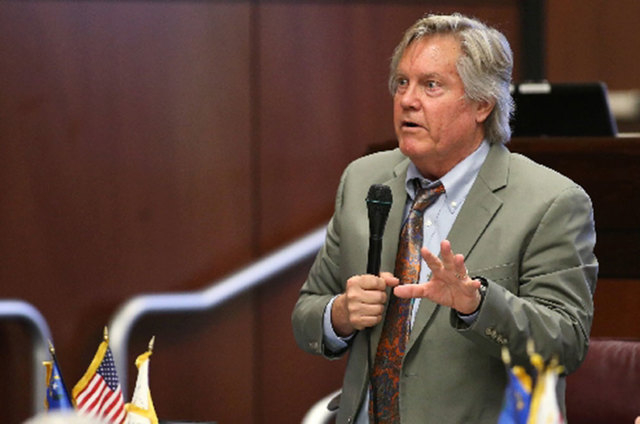Nevada gives final OK to medical marijuana dispensary rules
CARSON CITY — State Sen. Tick Segerblom said his goal is to have one medical marijuana dispensary operating in Nevada by the end of the year following the final adoption Friday of regulations establishing the state rules for the facilities to operate.
Now that the state regulations mapping out how the program will be implemented have been approved by the Legislative Commission, it is time for local governments to “get off their butts” and adopt their own rules for the dispensaries to operate, he said.
The regulations were adopted without any comments or questions from lawmakers serving on the commission or the public.
“A lot of local jurisdictions said they wanted to wait until the state regulations were adopted,” Segerblom said. “Well, now they are adopted. We’ve waited 14 years. It’s time to get moving.”
Segerblom, D-Las Vegas, who authored the bill in the 2013 session to establish the medical marijuana dispensary program, said Clark County is the only entity so far that is moving forward quickly to establish local rules for the businesses to operate.
Now that the state regulations are adopted, the business of accepting applications from those interested in participating in the program will move forward.
At the state Board of Health hearing earlier this month where the regulations saw initial approval, attendees were told there will be a 45-day notice announcing the date that applications will be accepted.
Once the application period opens, there will only be a 10-day window for accepting them. After the application period closes, the state must make a decision on each application within 90 days of receiving it.
But even before a dispensary can open, a state lab needs to be ready to test the marijuana.
Before that, the plant needs to be cultivated.
And to avoid having to import seeds from other states to begin the growing process, dispensary owners may buy specific strains from current patients in the state, the law stipulates.
The adopted regulations were drafted by the state Division of Public and Behavioral Health and will take effect April 1.
The regulations were modified at least 70 times since the bill’s approval — from security systems to setbacks from neighborhoods to ranking and processing applications.
Marla McDade Williams, deputy administrator of the division, said the agency is still in the process of hiring the staff needed to move forward with the application process.
The goal is to start accepting applications in May or June, but no firm date has been set yet, she said.
“Training is very important,” Williams said. “We have to make sure staff is using very systematic tools in ranking the applications. We don’t want to get caught up in subjective decision-making.”
The agency has estimated that about 425 applications for all of the types of services to be provided under the law, including growing facilities and dispensaries, will be received for processing.
The Legislature in 2013 overwhelmingly approved Assembly Bill 374 authorizing 66 dispensaries to operate in the Silver State, 40 of them in Clark County.
Voters approved a constitutional amendment providing for medical marijuana in 2000, and much of the legislative support for the bill came from lawmakers who said it was their legal responsibility to make the product available to patients.
The current system requires patients to grow their own or get it from caregivers who grow it and donate it to patients. The reality is many buy the drug from illegal suppliers.
Segerblom commended Williams and the division staff for the getting the regulation process completed so efficiently.
This is a developing story. Check back for updates.
Contact Capital Bureau reporter Sean Whaley at swhaley@reviewjournal.com or 775-687-3900. Follow him on Twitter @seanw801.






















